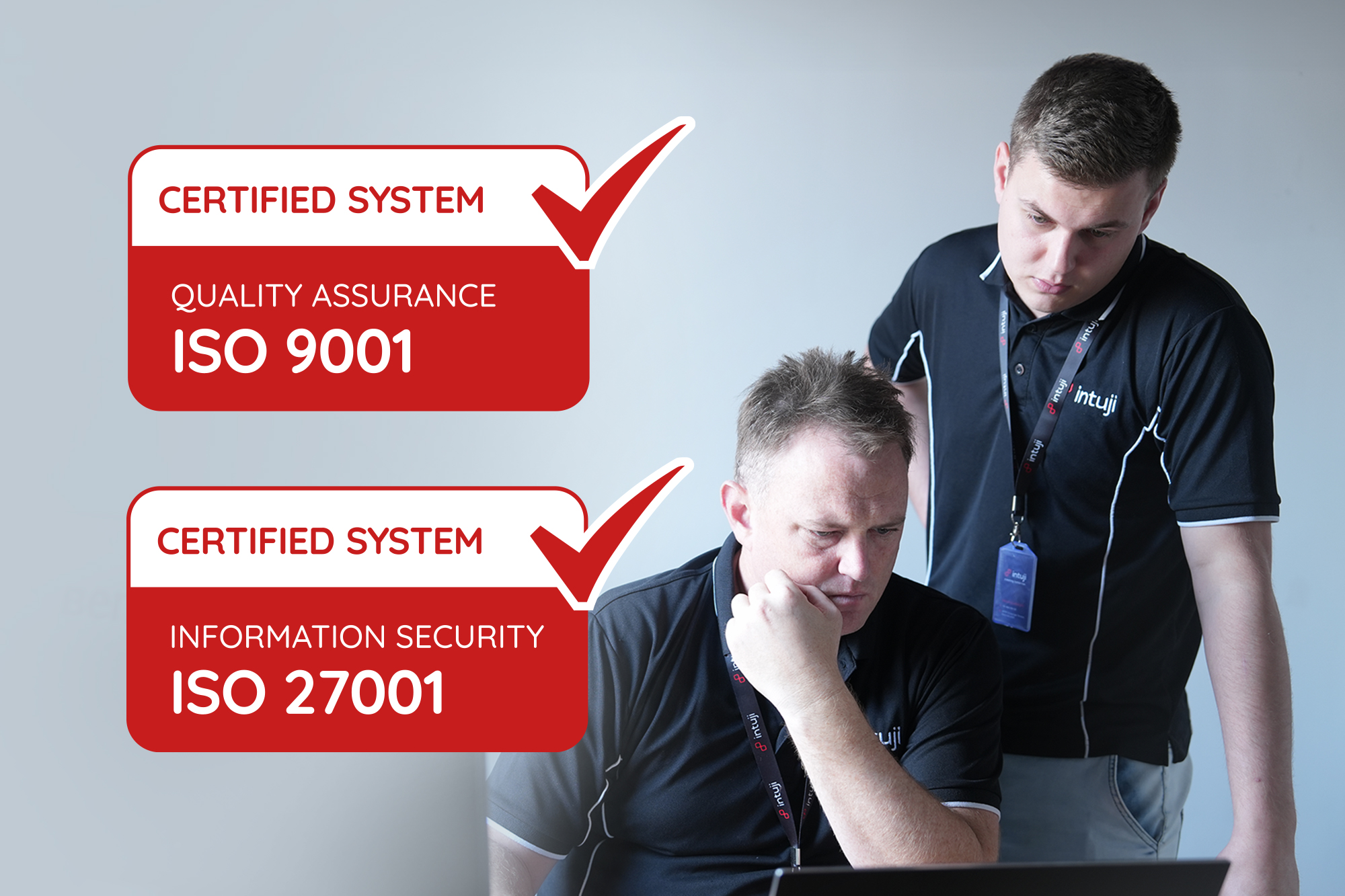
Intuji Assures Quality and Security with ISO 9001 and ISO 27001 Certifications
Julian Wallis
10 min read

ISO certifications play a vital role in ensuring organisations’ quality and security standards across various industries. ISO 9001 and ISO 27001 stand out as essential benchmarks for companies striving for excellence in their operations.
At Intuji, we take these aspects seriously, which is why we are proud to announce our certification with ISO 9001 and ISO 27001 standards. These certifications not only signify our commitment to excellence but also underscore our dedication to providing secure and top-notch services to our clients.
In this article, we’ll delve into the significance of these certifications and why we decided to obtain them to enhance our organisational credibility and reliability.
What are ISO Certifications? 🤔
ISO certifications are globally recognised standards issued by the International Organization for Standardisation (ISO). ISO certifications demonstrate an organisation’s commitment to meeting international standards of quality, security, and efficiency.
ISO certifications cover a wide range of domains, including quality management, environmental management, information security, occupational health and safety, and many others. Each ISO certification is designed to establish a set of best practices and requirements that organisations must meet to achieve certification.
All About ISO 9001 Certification 👍
Let’s start first by understanding ISO 9001. ISO 9001 certification is an internationally recognised Quality Management Systems (QMS) standard. It sets out the criteria for a quality management system and is based on several quality management principles, including a strong customer focus, the involvement of top management, a process approach, and continual improvement.
For Intuji, achieving ISO 9001 certification means that our quality management system has been independently audited and validated to meet these stringent standards. It demonstrates our ability to consistently provide products and services that meet customer and regulatory requirements, enhance customer satisfaction, and continually improve our quality control processes to deliver better value for the end user.
ISO 27001 Certification 🔐
Companies seeking ISO 27001 certification undertake rigorous assessments of data security risks and establish a comprehensive suite of information security controls to mitigate them.
Ensuring robust data protection standards is imperative for software development companies like ours. Enter ISO 27001 certification — a hallmark of trust and commitment to data security.
ISO/IEC 27001, an internationally recognised information security standard, sets the framework for deploying, maintaining, and evolving Information Security Management Systems (ISMS).
While ISO 9001 focuses on quality management, ISO 27001 deals specifically with Information Security Management Systems (ISMS). Given that we are a software development company, the ISO 27001 certification holds particular significance for us and our clients.
What Does the ISO 27001 Certification Represent? ⚙️
ISO 27001 certification goes beyond a mere acknowledgment of compliance; it signifies a dedication to safeguarding data and upholding the highest information security standards.
Choosing to partner with ISO 27001-certified companies ensures not only technological excellence but also a steadfast commitment to data security and ongoing improvement. In an era where data integrity and confidentiality are paramount, prioritising partnerships with certified companies is a strategic decision that fosters trust, reliability, and long-term success.
ISO 27001 is designed to ensure the selection of adequate and proportionate security controls that protect information assets and give confidence to interested parties. It encompasses various aspects of information security, including data confidentiality, integrity, and availability.
By achieving ISO 27001 certification, we have solidified our commitment to implementing robust information security practices. This means that we have established and continually improved our ISMS to manage and mitigate information security risks, ensuring the confidentiality, integrity, and availability of our clients’ sensitive information and data.
ISO 27001 Certification Process and Benefits 🔥
Obtaining ISO 27001 certification involves an external audit conducted by an accredited certification body. Successful completion of this audit validates an organisation’s compliance with the standard’s requirements.
Deploying ISO 27001 has brought about several advantages to our company as well as to our customers:
Comprehensive Data Security Management: ISO 27001-certified companies embrace a systematic approach to information security management, encompassing risk management and data processing infrastructure. ISMS represents a modern, proactive security system focused on safeguarding information assets.
Assurance of Safety: ISO 27001 certification assures clients that their data will be handled by competent, trained professionals in adherence to legal requirements and industry standards.
Enhanced Trust and Reduced Oversight: ISO 27001 companies implement a framework of principles, procedures, analyses, and controls that instil confidence in clients, minimising the need for constant monitoring while ensuring data safety.
Commitment to Continuous Improvement: ISO 27001 certification signifies a commitment to ongoing enhancement of services, technology, and the Data Security Management System. Companies prioritise proactive responses to emerging security threats and continually elevate their processes.
Partnership and Consultation: Certified companies serve as service providers, consultants, and partners who are invested in client projects. ISO 27001 certification underscores a company’s modernity, commitment, responsibility, and trustworthiness, strengthening the client-provider relationship.
The Steps We Took To Achieve The ISO 27001 Certification 🧗
At Intuji, safeguarding sensitive information and ensuring the utmost security of our operations has always been paramount. Behind the achievement of the ISO 27001 certification is a meticulous consolidation process and adherence to internationally recognised standards. Here’s a glimpse into the measures we’ve implemented to secure this prestigious award:
Network Segregation: We’ve leveraged VLAN technology to segment and fortify our network infrastructure, ensuring robust protection against unauthorised access.
Access Control: Confidentiality is vital. We’ve fortified our devices and locations against potential breaches through stringent access controls tailored to different sensitivity levels.
CCTV Monitoring: Vigilance is our watchword. CCTV monitoring has now been installed in all the critical areas of our office, enhancing surveillance and deterring potential security threats.
Official Devices: Standardization breeds security. Equipping every team member with official devices ensures uniform adherence to our rigorous security protocols.
Vulnerability Assessments and Penetration Testing (VAPT): Proactivity is our shield. Rigorous VAPT assessments have fortified our defences, preempting vulnerabilities before they can be exploited.
Remote Monitoring and Management (RMM): Efficiency meets security. RMM tools empower us to monitor and manage our systems remotely, ensuring continuous vigilance and rapid response to emerging threats.
Asset Management: By meticulously listing and tagging assets following ISO standards, we’ve enhanced our ability to track and manage critical resources.
Firewall Vigilance: Unwanted access stops here. Our firewall rules stand sentinel, blocking unauthorised access to ensure the integrity of our network.
IT Requisition System: Our IT requisition system ensures that all requests for IT assets undergo thorough scrutiny, minimising the risk of unauthorised access.
But wait, there’s more. Every improvement undertaken underscores our dedication to meticulous security protocols, from the addition of fire extinguishers to the prevention of unwanted application installations on official devices. Workstation locks after two minutes of idle time, alongside measures to prevent the installation of pirated software and mandatory security patch installations for all operating systems, further fortify our defences.
Additionally, disabling USB drives in the official system, monitoring CPU, bandwidth, and memory usage for anomalies, and employing Remote Monitoring and Management (RMM) tools for thorough device inspection and cleanup exemplify our proactive approach to security. Even the recent updates to our employee onboarding checklist reflect our commitment to instilling security consciousness from day one.
And the journey continues. Each step, each measure, is a testament to our unwavering commitment to the security and integrity of our operations. With ISO 27001 certification in hand, we stand ready to deliver exceptional software development services and peace of mind to our clients and stakeholders, knowing that their trust is well placed in our secure hands.
The Significance of These Certifications For Our Clients 🤝
The attainment of ISO 9001 and 27001 certifications is not merely a badge of honour for Intuji; it also holds profound implications for our clients.
Firstly, it instils confidence in our clients that we adhere to globally recognised standards for quality management and information security. This assurance is crucial in an era where data breaches and quality lapses can severely affect businesses.
Secondly, these certifications signify our commitment to maintaining the highest standards in our service delivery. By following structured processes and implementing stringent security measures, we assure our clients that their projects are in safe hands.
Moreover, ISO certifications are not a one-time achievement; they require an ongoing commitment to continual improvement. Thus, our clients can trust that our dedication to excellence will persist, ensuring our service remains exceptional over time.
Exploring The Differences & Similarities Between ISO 9001 & 27001 🆚
Though distinct in their objectives, ISO 9001 and ISO 27001 present unique challenges and opportunities for organisations aiming to bolster their management systems. Before delving into their convergence, it is crucial to dissect the divergent requirements that necessitate separate efforts, notably the Information Security Risk Assessment mandated by ISO 27001.
Developing a robust methodology for identifying and mitigating information security risks, independent of ISO 9001’s risk and opportunity management, forms a pivotal aspect of ISO 27001 compliance. Herein lies the complexity of aligning these standards.
Key Differences between ISO 27001 & 9001 😄
Scope Determination: ISO 9001 encompasses products and services, while ISO 27001 extends to include interfaces and dependencies between processes. ISO 9001 allows exclusions if they don’t impede customer satisfaction enhancement.
Leadership and Commitment: ISO 9001 emphasises customer-focused approaches to meet requirements and ensure customer satisfaction. ISO 27001 prioritises information security risk management and compliance with statutory and regulatory mandates.
Policy Establishment: ISO 9001 necessitates establishing and communicating a quality policy. ISO 27001 focuses on aligning policies with information security objectives.
Control Set: ISO 27001 provides a predefined set of controls in Annex A for mitigating risks, whereas ISO 9001 lacks a similar control framework.
Resources Allocation: ISO 9001 requires specific resources for product/service conformity, including personnel, infrastructure, and knowledge. ISO 27001 emphasises resource allocation for information security management.
Similarities between ISO 9001 & 27001 Certifications 😲
Despite these disparities, the alliance between ISO 9001 and ISO 27001 offers opportunities for integrated implementation. Here are a few examples of how that’s possible.
Context Analysis: Both standards mandate identifying internal and external issues pertinent to organisational operations.
Stakeholder Engagement: Identifying stakeholder needs and expectations that align with quality and information security objectives.
Roles and Responsibilities: Defining roles and responsibilities for QMS and ISMS aligns with both standards, albeit with variations.
Competence and Communication: Addressing competence, awareness, and communication requirements can be streamlined across both systems.
Monitoring and Review: Continuous measurement, monitoring, and management review processes align, facilitating integrated audits.
Benefits of Integrating ISO 9001 & 27001 👍
Holistic Management Approach: Integrated systems streamline operations and reduce administrative burden, enhancing organisational performance.
Compliance with International Standards: Dual certification demonstrates compliance with rigorous requirements, bolstering credibility with customers and regulators.
Demonstrated Commitment: Simultaneous certification showcases dedication to information security risk management and quality assurance, enhancing stakeholder trust and satisfaction.
Enhanced Market Competitiveness: Dual certification confers a competitive edge, signalling reduced risk and superior service delivery capabilities, thereby boosting market appeal.
Simplified Compliance Mapping: ISO standards’ comprehensive nature facilitates alignment with other regulations or standards, easing compliance efforts.
Ultimately, while the disparities between ISO 9001 and ISO 27001 necessitate distinct efforts, leveraging their synergies through integration offers compelling benefits, paving the way for enhanced organisational resilience, credibility, and competitiveness in today’s dynamic tech landscape.
Conclusion – ISO 9001 & 27001 Certifications 🤓
To wrap this up, Intuji’s attainment of ISO 9001 and 27001 certifications underscores our unwavering commitment to quality and security in software development. These certifications are not just symbols; they represent our pledge to deliver outstanding services to our clients while upholding the highest quality and security standards.
With ISO 9001 and 27001 certifications in place, our clients can be confident that their projects are in good hands and in the hands of a company dedicated to excellence and continual improvement.
Topics
Published On
April 22, 2024

